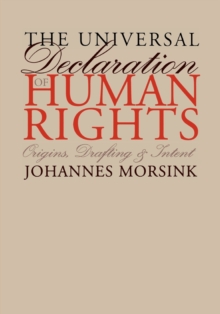
Indivisible Human Rights : A History PDF
by Daniel J. Whelan
Part of the Pennsylvania Studies in Human Rights series
Description
Human rights activists frequently claim that human rights are indivisible, and the United Nations has declared the indivisibility, interdependency, and interrelatedness of these rights to be beyond dispute.
Yet in practice a significant divide remains between the two grand categories of human rights: civil and political rights, on the one hand, and economic, social, and cultural rights on the other.
To date, few scholars have critically examined how the notion of indivisibility has shaped the complex relationship between these two sets of rights. In Indivisible Human Rights, Daniel J. Whelan offers a carefully crafted account of the rhetoric of indivisibility.
Whelan traces the political and historical development of the concept, which originated in the contentious debates surrounding the translation of the Universal Declaration of Human Rights into binding treaty law as two separate Covenants on Human Rights.
In the 1960s and 1970s, Whelan demonstrates, postcolonial states employed a revisionist rhetoric of indivisibility to elevate economic and social rights over civil and political rights, eventually resulting in the declaration of a right to development.
By the 1990s, the rhetoric of indivisibility had shifted to emphasize restoration of the fundamental unity of human rights and reaffirm the obligation of states to uphold both major human rights categories—thus opening the door to charges of violations resulting from underdevelopment and poverty. As Indivisible Human Rights illustrates, the rhetoric of indivisibility has frequently been used to further political ends that have little to do with promoting the rights of the individual.
Drawing on scores of original documents, many of them long forgotten, Whelan lets the players in this drama speak for themselves, revealing the conflicts and compromises behind a half century of human rights discourse.
Indivisible Human Rights will be welcomed by scholars and practitioners seeking a deeper understanding of the complexities surrounding the realization of human rights.
Information
-
Download - Immediately Available
- Format:PDF
- Pages:328 pages
- Publisher:University of Pennsylvania Press
- Publication Date:06/06/2011
- Category:
- ISBN:9780812205404
Other Formats
- Hardback from £71.49
Information
-
Download - Immediately Available
- Format:PDF
- Pages:328 pages
- Publisher:University of Pennsylvania Press
- Publication Date:06/06/2011
- Category:
- ISBN:9780812205404










